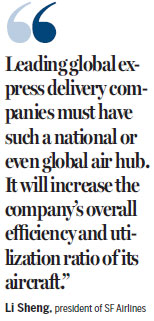Delivery giant SF Express to build airport in Central China
Updated: 2015-08-18 07:58
By Chai Hua in Shenzhen(HK Edition)
|
|||||||||
Shenzhen-based SF Express, the mainland's largest private express logistics firm, is now looking to construct an airport in the heart of the country.
The location of the airport is reportedly Ezhou, a city near Wuhan, the capital city of Hubei province. It is expected to provide services for the high-end express delivery market and cover 90 percent of the mainland with flight times of barely a couple of hours.
Gu Qian, public relations manager at SF Express (Group) Co Ltd, told China Daily that the company would like to choose a location in Central China so that the project could be included in the Yangtze River Delta Economic Zone and support the development of the nation's multinational "One Belt, One Road" trade initiative.
Staff have been flying frequently to Hubei province, but the location has yet to be decided, Gu disclosed.
Charles Wang Guowen, director of the Center for Logistics and Supply Chain Management at the China Development Institute, believes regions in Central China, near or around Wuhan city, would be ideal.
"It covers most of the mainland within one-and-a-half hours of air travel time," he said. "But the disadvantage still lies in the limits to airspace, which exist in any city on the mainland."
Experts believe that such an airport is essential for the development of mainland logistics firms.
SF Express has so far established regional hubs in Beijing, Hangzhou and Shenzhen.

On the mainland, most airports are experiencing congestion due to the increase in passenger and cargo volume, Wang noted. He said: "The congestion is not only at the airport, but also in the sky."
In the civil aviation industry, passengers are given priority over cargo. Li Sheng, president of SF Airlines, a subsidiary of SF Express, said: "All of the more than 200 airports on the mainland are designed mainly for passengers. The need for express delivery and cargo is of lesser consideration."
Amid such a scenario, cargo delivery inevitably gives way to passenger transport in some busy airports, Li said. "Leading global express delivery companies must have such a national or even global air hub. It will increase the company's overall efficiency and utilization ratio of its aircraft," Li told this year's China Civil Aviation Development Forum, held June 24 to 25 in Beijing.
The ambitious SF Express package delivery company was founded in 1993 in Hong Kong by a 22-year-old entrepreneur, Wang Wei. Starting out with just HK$100,000, Wang was to become a multi-millionaire within just three years and ranked 26th on the Forbes China Rich List of 2014.
His company, dubbed the "FedEx" of the mainland, started with the Hong Kong-Shenzhen route and as of July covered 31 mainland provinces and nine international routes.
Wang believes that SF's airport hub has the potential to become the largest even in the world, "if things all go right".
"China has been the largest logistics economy for nearly a decade. With its large population entering an air transport consumption age, there is enough evidence to expect that the air hub will be the largest in Asia, or even in the world," he explained.
But that would take time. Industry experts say the proposed SF air hub will have some way to go before it can compete with one of the busiest in the world - the Memphis airport hub of US global courier services company FedEx, which owns 650 aircraft and covers more than 220 countries and territories.
SF currently has 19 cargo aircraft and leases another 20, even though its target is to own 100 aircraft by 2020.
"Compared with FedEx, SF is still a 'small brother' in terms of business capacity. But once the hub is approved and built, SF and this Central China hub will be very speedy in catching up with Memphis, considering the fast business growth rate of SF Express," Wang said.
SF Express' delivery by air of 830,000 tons accounted for 20 percent of the national total in 2014.
With its meteoric rise, the group has come to symbolize the rapid growth of private companies in Shenzhen.
The 2015 Fortune 500 list of top global companies released last month included more than 100 mainland enterprises. Though most of them are State-owned companies, Shenzhen-based companies named are the exception in that most are privately held.
Ninety percent of all enterprises in Shenzhen are privately owned and contribute to more than a third of the gross domestic product of the city.
Eleven firms from Shenzhen were listed among the top 500 private companies on the mainland in 2014 in rankings published by the All-China Federation of Industry and Commerce, and three from the city were among the top 10. As for total revenue, four Shenzhen companies made it into the top 50, the highest for any first-tier city.
grace@chinadailyhk.com
(HK Edition 08/18/2015 page8)